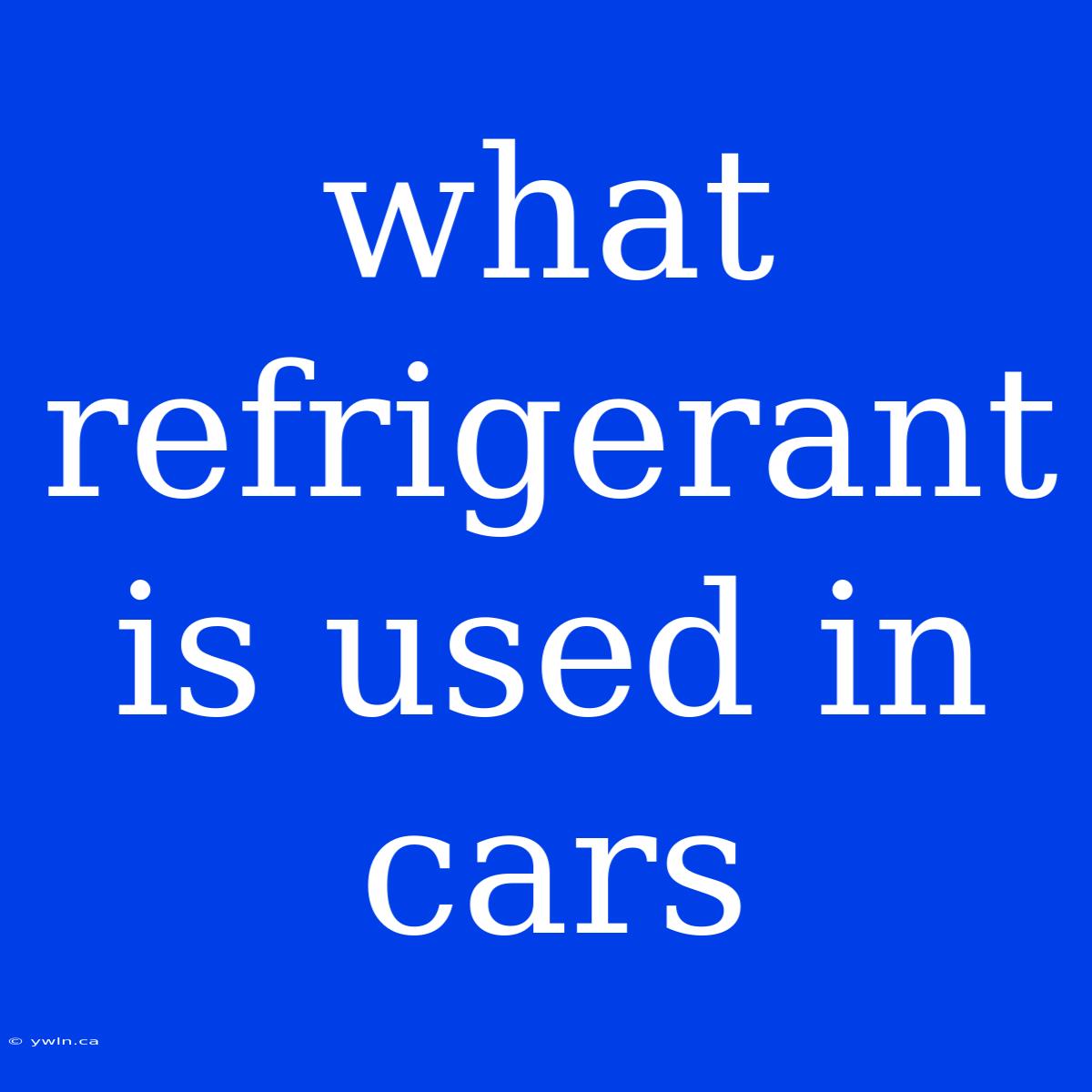What Refrigerant is Used in Cars? Unraveling the Coolant Behind Your AC
Hook: What keeps your car cool on a scorching summer day? Refrigerant! This vital component silently works behind the scenes, ensuring your comfort and driving pleasure.
Editor Note: This article explores the world of refrigerant in cars, explaining the types, their impact on the environment, and how to make informed choices for your vehicle.
Analysis: As car owners, we often take our air conditioning systems for granted, until they malfunction. To understand what's going on under the hood, it's crucial to know the ins and outs of refrigerant, its properties, and its role in keeping your car cool. This guide aims to provide comprehensive information on this essential component, so you can make informed decisions about your vehicle's air conditioning system.
Key Takeaways:
| Aspect | Details |
|---|---|
| Refrigerant Types | R134a, R1234yf |
| Environmental Impact | Global Warming Potential (GWP), Ozone Depletion Potential (ODP) |
| Safety Concerns | Flammability, Toxicity |
| Maintenance | Regular Checks, Proper Handling |
Refrigerant in Cars
Introduction: Refrigerant is a key component in your car's air conditioning system, responsible for transferring heat and cooling the air inside your vehicle.
Key Aspects:
- Types of Refrigerant:
- R134a: Widely used in older cars, it's a relatively safe and effective refrigerant but has a high GWP.
- R1234yf: Introduced in newer vehicles, it boasts a lower GWP and ODP, making it more environmentally friendly.
- Refrigerant Properties:
- Boiling Point: The temperature at which refrigerant changes from liquid to gas, absorbing heat.
- Condensation Point: The temperature at which refrigerant changes from gas to liquid, releasing heat.
- Refrigerant Cycle:
- Compression: Refrigerant is compressed, raising its temperature and pressure.
- Condensation: Hot refrigerant gas condenses into a liquid, releasing heat into the environment.
- Expansion: Refrigerant expands through a valve, lowering its temperature and pressure.
- Evaporation: Cold refrigerant absorbs heat from the air inside the car, evaporating back into a gas.
Discussion: The selection of refrigerant is crucial for both environmental sustainability and performance. R134a, while effective, contributes significantly to climate change due to its high GWP. R1234yf, while a more environmentally friendly alternative, has faced some safety concerns due to its flammability.
R134a
Introduction: R134a, also known as HFC-134a, was widely adopted as the standard refrigerant in cars from the 1990s onwards.
Facets:
- Role: R134a effectively cools the cabin air, providing comfort during hot weather.
- Advantages: Relatively safe, readily available, and cost-effective.
- Disadvantages: High GWP, contributing to climate change.
- Risks: Leakage can lead to system malfunctions and performance degradation.
- Mitigations: Regular maintenance, leak checks, and responsible disposal of R134a are crucial.
Summary: R134a's widespread use has contributed to environmental issues. As regulations evolve, its use is gradually being phased out in favor of more environmentally friendly options.
R1234yf
Introduction: R1234yf, a hydrofluoroolefin (HFO), is a newer refrigerant designed to replace R134a in newer vehicles.
Facets:
- Role: Provides efficient cooling similar to R134a, while being significantly more environmentally friendly.
- Advantages: Lower GWP and ODP, making it a sustainable choice.
- Disadvantages: Flammability, leading to safety concerns in certain situations.
- Risks: Leakage or a fire in the engine compartment could ignite the refrigerant.
- Mitigations: Careful handling, leak detection systems, and appropriate safety protocols are vital.
Summary: R1234yf offers a more environmentally conscious solution, but its flammability requires careful handling and safety precautions.
FAQ
Introduction: Common questions about refrigerant in cars and their environmental impact.
Questions:
- Q: Is R1234yf safe?
- A: While it is flammable, R1234yf is considered safe when handled properly, and its flammability risk is lower compared to other refrigerants.
- Q: Can I convert my car to use R1234yf?
- A: It's not recommended to convert older vehicles to R1234yf without professional expertise and proper components, as the system may not be compatible.
- Q: What should I do if my car's refrigerant leaks?
- A: Have your car inspected by a qualified technician to identify the leak and repair it immediately.
- Q: Is it okay to top off my car's refrigerant myself?
- A: It's not recommended to top off your refrigerant yourself, as this can lead to overcharging the system and potential damage.
- Q: How often should I check my car's refrigerant?
- A: It's a good practice to have your air conditioning system inspected by a mechanic at least once a year, particularly before the summer months.
- Q: Where can I dispose of old refrigerant?
- A: Dispose of old refrigerant responsibly at a certified recycling facility or through a professional automotive repair shop.
Summary: Choosing the right refrigerant for your car depends on factors like age, compatibility, and environmental concerns.
Tips
Introduction: Keeping your car's air conditioning system running efficiently.
Tips:
- Regular Inspections: Have your air conditioning system checked annually by a qualified mechanic.
- Early Detection: Pay attention to warning signs like weak cooling, unusual noises, or refrigerant smells.
- Proper Handling: Never attempt to top off refrigerant yourself, and always seek professional help for repairs.
- Safe Disposal: Dispose of refrigerant properly through certified recycling facilities or automotive repair shops.
- Avoid Overuse: Excessive use of your air conditioning system can strain the system, so consider opening windows when temperatures are moderate.
Summary: Proper maintenance and responsible practices ensure your air conditioning system operates efficiently while protecting the environment.
Closing Message: Understanding the different types of refrigerants used in cars is vital for both your car's performance and environmental consciousness. As technology advances, new refrigerants with enhanced sustainability are emerging. Making informed decisions about your car's air conditioning system ensures comfort, performance, and responsible driving for a cooler future.

